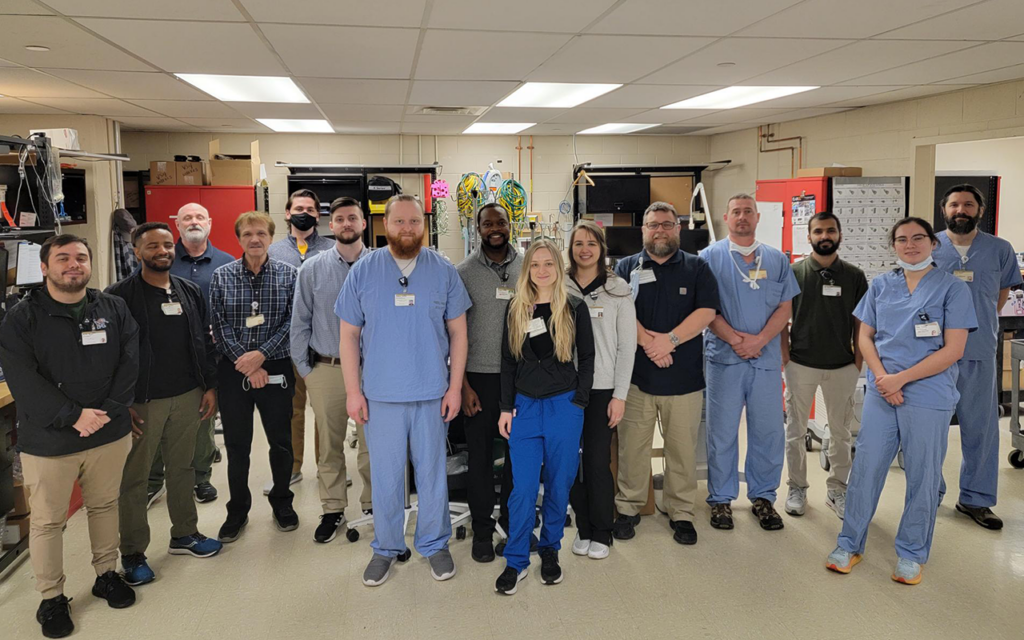The TRIMEDX team at Vanderbilt University Medical Center was recently featured as Department of the Month in the April 2023 edition of TechNation. The published article, as it appeared April 1, 2023, is below.
Tennessee is often best known for being the location of Nashville; the home of country music and the Grand Ole Opry. It is also known for Elvis Presley’s Graceland in Memphis.
The state has much more to offer, including beautiful landscapes and state parks, the Great Smoky Mountains, and good barbeque.
One of the health care providers in the state has a national reputation for its children’s hospital, cancer center, and diabetes center. Vanderbilt University Medical Center is based in Nashville and has a focus on research and teaching, in addition to patient care. The health system is the largest non-government employer in Middle Tennessee. It serves more than 3 million patients annually.
Handling medical equipment management for this respected institution is the TRIMEDX Vanderbilt Clinical Engineering Department.
The team includes Site Director Mark Speckmann; Senior Site Manager of Imaging Larry Cunningham; Senior Site Manager of Biomed Derrick Cole; Biomed Supervisor Deb McGraw; Biomed Supervisor Rick Clark; CEIT Supervisor James Bryan; nine imaging engineers, three CEIT specialists, and 22 biomeds.
Clinical engineering oversees an inventory of 43,000 pieces of equipment at two main hospitals, consisting of 1,400 adult beds and 400 children’s beds, 370 offsite clinics, including three large surgery centers and two large clinics.
“We provide a full-service clinical engineering shop and also are asked to support Vanderbilt in numerous capacities,” Cole says.
Those capacities include a trained in-house staff, contract management, CE/IT support, project management and capital requests.
The department manages all equipment contracts and works in conjunction with TRIMEDX corporate to determine if a contract is more beneficial than T and M.
The team integrates clinical engineering and IT internally with its specialists.
“We have a dedicated team that’s responsible for managing all the CE/IT integrations within all our facilities. Those include accounting for all network configurations, software patches and server upgrades,” Cole says.
Addressing Projects and Troubleshooting
With such a large health system, the probability that special projects will arise is increased proportionately. The CE team is poised to handle these projects.
“We are oftentimes asked to participate in special projects and those vary in all areas,” Cole says.
He says that working with Philips to perform house-wide software updates on all monitors is one example.
“This required working with Philips’ project managers to determine an implementation schedule for both hospitals. Coordinating with hospital leadership to approve the implantation schedules and sending those notification out to department leaders. Accommodating a large Philips’ team to assist with the work and providing them the proper credentials,” Cole adds.
He says that the project also required identifying a specific number of loaner monitors to keep and new revisions, that would allow for replacements if one failed.
He adds that participating in weekly communications to review completion status and escalating equipment failures was also a part of the project.
The team has also been involved in deinstalling and re-installing equipment during renovation projects.
“During the high COVID-19 periods, we were often asked to help convert patient areas to accommodate an influx of patients. Sometimes those included the adding or removal of patient monitors and updating the profiles to match the patient populations,” Cole says.
He says that this involved reprograming servers to increase the patient visibility to the appropriate monitoring rooms, checking and tracking rental equipment for proposed areas and returning areas back to their previous configurations once patient volumes decreased.
“Collecting hardware and software data from all equipment and working with Health IT to address unsupported equipment. Our entire team is required to enter the appropriate CDI information on any new devices that enter our facilities,” Cole says.
He says that after transferring to the new database, they had to collect or confirm the CDI data on over 8,000 devices.
“That information includes network configurations, software revisions and operating systems,” Cole says.
He adds that the team meets monthly with Vanderbilt Health IT to help identify unsafe operating platforms and follow up with those vendors for solutions. They also are required to perform routine patches on servers and address any virus-related issues.
In addition to these many projects, the CE team put on their problem-solving caps to troubleshoot a variety of problems.
“We have over 100 sterilizers and numerous cart washers in our facilities. Occasionally those experience electrical, plumbing and gas related failures, that are not directly an equipment failure. Our technicians would troubleshoot to determine the root cause and work with the facilities team to help repair utility failure,” Cole says.
He says that most sterilizer or washer failures are isolated issues and require in-depth troubleshooting to resolve.
“All these systems – along with imaging rooms – are fed by various hospital-supplied utilities and we are responsible for the systems up until those connections. We had issues when the high-pressure alarms sounded on a sterilizer and we had to determine if it was an internal or supply line failure. Of course, these get a lot of attention and our response and turnaround time is critical,” Cole says.
He explains that if the failure is deemed a supply issue, the department will coordinate with the appropriate facilities team to address it.
“After their repair is completed, we perform a full operational check to make sure the systems are functioning properly,” Cole adds.
The TRIMEDX Vanderbilt CE team brings their A-game to work every day to match the reputation of the health system they support.
